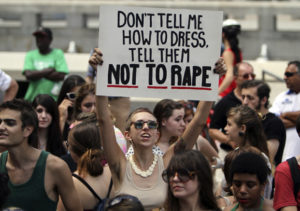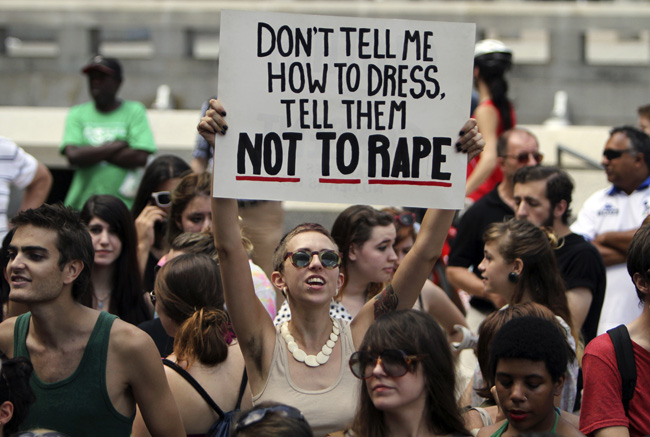I was inspired recently by this post on Finally, a Feminism 101 Blog which addressed the Frequently Asked Question, “What’s wrong with suggesting that women take precautions to prevent being raped?

A participant holds up a sign during the Slut Walk demonstration in Philadelphia, on Saturday, Aug. 6, 2011. Organizers of the walks aim to raise awareness for womenÃs issues including the fact that no woman asks to be raped because of her style of dress. (AP Photo/Joseph Kaczmarek)
Well, a lot.
I decided I wanted to talk about it here on my own blog, as well as share the excellent article on Feminism 101 with you. This is a question I struggled with myself for a long time, even after my own experience with assault (which this concept applies to as well). At first it sounds silly, doesn’t it? What’s wrong with teaching people how to be safe?
The thing wrong with it is basically this:
It puts the focus on the victim rather than the perpetrator. A person is not responsible for getting raped or assaulted, rather, a person is responsible for raping or assaulting. It’s all right there in the verbs, you see.
Let’s look at this. What are the things they tell women to do to prevent getting raped?
-don’t dress immodestly (whatever that means)
-don’t get drunk
-don’t walk alone at night
-don’t be a tease
-learn self-defense tactics
-carry pepper spray
-be a virgin/sexually pure
-watch your drink at all times
…and so on.
Well, I was wearing regular street clothes when I was sexually assaulted, I hadn’t had a drop of alcohol, it was in my own home, and it was one of my best friends. I said no but I didn’t fight back physically because I was afraid he would harm me. Guess what has never happened to me when I was drinking, walking alone at night, or carrying pepper spray?
Not that a person being extra vulnerable doesn’t contribute at all to them being a target—a significant number of rapes involve alcohol, for instance—but vulnerability comes in many forms, most rapes are committed by someone known to the victim, and you might as well tell women to avoid men altogether, even their own families, if you’re going to try to put it on them to avoid being raped.
The nature of men:
Rather than having a societal attitude that men by their very nature are beasts who will rape at the slightest provocation (like a short skirt or some shit), which is terribly unfair to men as well, and that all a woman can do is take some precautions and pray if she doesn’t want to get raped—let’s have a culture that teaches people that it is not okay to rape. Verbs again. Notice the active verb there.
Control:
I’ve also noticed this being used to control women. I have seen dads and boyfriends and pastors and so on use fears of rape to tell women what they can and can’t wear, where they can and can’t go, what kind of jobs they can hold, who they can and can’t have sex with, and so much more. They pass it off as being concerned for their safety, but most of the time you can tell there’s an underlying insecurity of their own dictating these rules, not an actual concern for the woman’s safety, especially considering how unhelpful most of these rules actually are for preventing rape.
Rules don’t make you safe:
It is misleading to suggest that women can be safe from sexual assault and rape if they follow a certain set of rules. It implies that rapists are a certain type of person in a certain type of setting, who prey on a certain type of woman. In fact, rapists target different kinds of people and can be anyone.
The fact of the matter is that women are not targets because they wore short skirts or went out alone or provoked the man, but because they are women.
It is incredibly dangerous to oversimplify rape to such an extent, to picture it only as something strangers do to drunk slutty girls in back alleys in the middle of the night. Most rapes look very, very different from that. A woman would have to treat every man she knew as a potential rapist to avoid rape, because any man could be one, in theory. Any person could be one, in fact.
Virgins and sluts:
And as far as the whole idea that you’re more safe if you’re a virgin or sexually inexperienced—or that if you’re sexually experienced you’re a “slut” and therefore can’t be raped; in other words, that taking someone’s virginity is what makes it rape and not the fact of it being unwanted intercourse—I call severe bullshit. I couldn’t find statistics on this—please, if you know of any, share them in the comments—but from what I’ve seen of our culture as well as others, virgins are common targets and obviously you can be raped whether or not you’ve had sex before.
Rape is not defined by one’s virginity, despite what many governments throughout the world say.
Anecdotally, I will back this up by saying that as a religious high school girl who wore virginity like a big neon sign plastered to her forehead, I was frequently targeted with harassment directly related to such. I literally had people tell me that I was more appealing as a target of rape because I was a virgin and therefore they “knew I would struggle,” which in the context of that particular creepy conversation was considered a turn-on. The person saying it was talking about why someone else was harassing me, but when I asked him how he knew all this about the guy’s psyche he got all weird and implied that he had felt the same thing.
Since losing my virginity and, several years afterward, coming across more confidently and maturely (in other words, looking more like someone who’s had sex before), I’ve experienced significantly less harassment in my general interactions with people.
Virginity is fetishized in our culture, and in many around the world even more severely. Having a characteristic that others fetishize makes you more likely to be a victim of assault, as you are more likely to be seen as a fetish object. If you want another example of this general concept, go ask most Asian-American women if they’ve ever been propositioned by a stranger to dress up as a naughty schoolgirl.
There are all kinds of factors that could lead to non-virgins being targeted more often, and they very well may be. Again, I have no statistics for this one. But I can say with confidence that being a virgin won’t protect you from rape if there is a rapist targeting you.
Which brings me back to my main point.
A rapist rapes:
By the very definition, to be raped is not in the victim’s control.
To put the emphasis of responsibility on victims is to not only assign a very hurtful blame to people who are trying to heal emotionally, but also to propagate a dangerous cultural idea that men can’t help but be rapists when faced with x or y situation.
Instead:
Instead, let’s teach our children (all genders alike, because while it’s far less common, women and other-gendered persons can be rapists too) that rape is wrong, and teach them how to tell what constitutes rape and assault. Let’s teach them what to do if they’re a victim of rape or assault—like who to go to, how to get out of the situation, etc as opposed to how to avoid provoking rapists. Let’s teach general safety, sure—lock your doors at night, be aware of your surroundings, listen to your gut when something seems off, and yeah, watch your drinks, all of y’all, including men, because I tell you what—the one time I was slipped something at a concert so was the man I was there with. (Thankfully we realized it and stuck together, coming out safely if distinctly shaken—a story for another day).
But watch what you’re teaching women to do that you’re not also teaching men, look for double standards, and for the love of god stop using the danger to control women. Don’t ask a victim what they were wearing when they were assaulted. Don’t tell victims how they could have done it differently. Don’t tell women that men can’t help themselves. Don’t raise them to believe rapists lurk in alleyways and not in the home. Don’t connect virginity with purity and safety. Don’t teach women that their virginity is what makes them valuable, and therefore losing it to rape is a “fate worse than death.”
Let’s work together to change this victim-blaming culture!
For more information about rape and assault as well as resources and help for victims, go to RAINN.org.
**We wanted to republish this very honest and thoughtful post by Samantha Clarke to encourage conversation and reflection around body politics and rape culture. Blaming the victim has become an almost indestructible virus that can only be changed by increasing visibility of the problem. We hope articles like this one can help you bring to light unconscious biases that exists not only in society a potentially in your own mind as well.
 Samantha is a hippie, writer, and blogger at the humorous feminist blog Jill of all Trades. She can also be found spending way too much time on Twitter.
Samantha is a hippie, writer, and blogger at the humorous feminist blog Jill of all Trades. She can also be found spending way too much time on Twitter.


